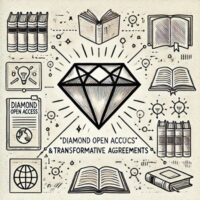
In September, a journalistic article on Diamond Open Access (by Wolfgang Benedikt Schmal and myself) and a preprint on Transformative Open Access Agreements (by Laura Rothfritz, Wolfgang Benedikt Schmal, and myself) were published.
On Diamond Open Access & Transformative Agreements
In 2023, 56% of research articles were published as Open Access, with 42% in Gold Open Access (OA) journals and 14% in hybrid journals, marking a significant rise since 2018. Despite this growth, many advocates of OA are pushing for Diamond Open Access, where publications are free for both authors and readers. Why do they think a turn to Diamond OA is so important? For which problem should Diamond OA be the solution?
On the one hand, critics argue that Gold OA has created barriers for poorer researchers and eroded editorial standards. On the other hand, transformative agreements have not reduced the power of commercial publishers – this is also the main result of our paper on Transformative OA Agreements (TAs).
TAs between academic publishers and research institutions are widespread, with the ESAC Initiative documenting over 1,000 contracts in its database. By web-scraping this data, we utilised the ESAC data and conducted an in-depth analysis using both qualitative and quantitative methods. Our findings suggest that research institutions are effectively „trapped“ in these agreements. Rather than facilitating a transition to full Open Access, the current system keeps academia in a hybrid model, which strengthens the market power of traditional publishers, reduces competition, and increases costs for libraries and universities.
But can Diamond OA really overcome these weaknesses of Gold OA and TAs/hybrid OA and provide both comprehensive and inclusive Open Access that is attractive to researchers? Benedikt Schmal and I are not so euphoric in this regard and ask whether Diamond OA faces challenges that have been insufficiently discussed so far, such as misconceptions about its costs and sustainability.
References:
Laura Rothfritz, Wolfgang Benedikt Schmal, Ulrich Herb (2024). Trapped in Transformative Agreements? A Multifaceted Analysis of >1,000 Contracts (arXiv:2409.20224). arXiv. http://arxiv.org/abs/2409.20224
Ulrich Herb & Wolfgang Benedikt Schmal (2024). The benefits of diamond are not crystal clear. Researchprofessional News, 26.09.2024
